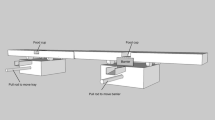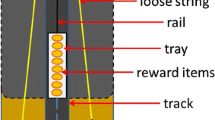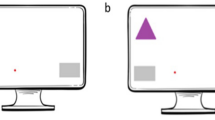Abstract
A captive pair of subadult male orangutans (Pongo pygmaeus) performed a cooperative task without training. Both partners had to pull a handle simultaneously in order for each to get food. They also learned the importance of the partner at the apparatus to make a successful response. The requirements of the cooperative task appear to have been understood by the orangutans, much like chimpanzees (Pan troglodytes) in the same situation. In contrast, capuchins (Cebus apella) succeeded in the cooperative task with a limited understanding of the requirement of the task and without taking into account the partner's role. These results gives further support to the hypothesis of a proximity of cognitive processes between chimpanzees and orangutans (in contrast to monkeys) though orangutans have not been seen to hunt cooperatively in the wild.
Similar content being viewed by others
REFERENCES
Anderson, J. R. (1984). The development of self-recognition: A review. Dev. Psychobiol. 17: 35–49.
Antinucci, F. (1989). Cognitive Structure and Development in Nonhuman Primates, Erlbaum Associates, Hillsdale, NJ.
Bard, K. A. (1993). Cognitive competence underlying tool use in free-ranging orangutans. In Berthelet, A., and Chavaillon, J. (eds.), The Use of Tools by Human and Nonhuman Primates, Oxford University Press, Oxford, pp. 103–117.
Beck, B. B. (1973). Cooperative tool use by captive Hamadryas baboons. Science 182: 594–597.
Boesch, C., and Boesch, H. (1989). Hunting behavior of wild chimpanzees in the Tai National Park. Am. J. Phys. Anthropol. 78: 547–573.
Brownell, C. A., and Carriger, M. S. (1990). Changes in cooperation and self-other differentiation during the second year of life. Child Dev. 61: 1164–1174.
Brownell, C. A., and Carriger, M. S. (1991). Collaboration among toddler peers: Individual contributions to social contexts. In Resnick, L. B., Levine, J. M., and Teasley, S.D. (eds.), Perspectives on Socially Shared Cognition, American Psychological Association, Washington, DC, pp. 365–383.
Chalmeau, R. (1994). Do chimpanzees cooperate in a learning task? Primates 35: 385–392.
Chalmeau, R., and Gallo, A. (1995). Cooperation in primates: Critical analysis of behavioural criteria. Behav. Proc. (Special Issue Cognit. Evol.) 35: 101–111.
Chalmeau, R., and Gallo, A. (1996). What chimpanzees (Pan troglodytes) learn in a cooperative task. Primates 37: 39–47.
Chalmeau, R., Visalberghi, E., and Gallo, A. (1997). Capuchins monkeys (Cebus apella) fail to understand a cooperative task. Anim. Behav. (in press).
Crawford, M. P. (1937). The cooperative solving of problems by young chimpanzees. Comp. Psychol. Monogr. 14: 1–88.
de Waal, F. B. M. (1982). Chimpanzee Politics: Power and Sex Among Apes, Harper and Row, New York.
de Waal, F. B. M. (1989). Peacemaking Among Primates, Harvard University Press, Cambridge, MA.
Edwards, S. D., and Snowdon, C. T. (1980). Social behavior of captive, group-living orangutans. Int. J. Primatol. 1: 39–62.
Fady, J. C. (1972). Absence de coopération de type instrumental en milieu naturel chez Papio papio. Behaviour 43: 157–164.
Galdikas, B. M. F. (1982). Orang-outan tool-use at Tanjung Puting reserve, Central Indonesian Borneo (Kalimantan Tengah). J. Hum. Evol. 10: 19–33.
Gallup, G. G. (1970). Chimpanzees: Self-recognition. Science 167: 86–87.
Jégat, R., and Chalmeau, R. (1982). Un dispositif pour réaliser des apprentissages en coopération chez des primates. Sci. Techn. Anim. Lab. 17: 121–125.
Kummer, H. (1982). Social knowledge in free-ranging primates. In Griffin, D. R. (ed.), Animal Mind — Human Mind, Springer-Verlag, Berlin, pp. 113–130.
Lethmate, J. (1982). Tool-using skills of orang-utans. J. Hum. Evol. 11: 49–64.
Natale, F., Antinucci, F., Spinozzi, G., and Poti, P. (1986). Stage 6 object concept in nonhuman primate cognition: A comparison between gorilla (Gorilla gorilla) and Japanese macaque (Macaca fuscata). J. Comp. Psychol. 100: 335–339.
Parker, S. T., and Gibson, K. R. (1977). Object manipulation, tool use and sensorimotor intelligence as feeding adaptations in cebus monkeys and great apes. J. Hum. Evol. 6: 623–641.
Parker, S. T., Mitchell, R. W., and Boccia, M. L. (1994). Self-awareness in Animals and Humans, Cambridge University Press, Cambridge.
Petit, O., Desportes, C., and Thierry, B. (1992). Differential probability of “coproduction” in two species of macaque (Macaca tonkeana, M. mulatta). Ethology 90: 107–120.
Piaget, J. (1952). The Origins of Intelligence in Children, Norton, New York.
Povinelli, D., Nelson, K. E., and Boysen, S. T. (1992a). Comprehension of role reversal in chimpanzees: Evidence of empathy? Anim. Behav. 43: 633–640.
Povinelli, D., Parks, K. A., and Novak, M. A. (1992b). Role reversal by rhesus monkeys but no evidence of empathy. Anim. Behav. 44: 269–281.
Rumbaugh, D. M. (1990). Comparative psychology and the great apes: Their competence in learning language number. Psychol. Rec. 40: 15–39.
Siegel, S. (1956). Nonparametric Statistics for the Behavioral Sciences, McGraw-Hill, New York.
Stoczkowski, W. (1994). Anthropologie Naïve, Anthropologie Savante, CNRS Editions, Paris.
Tomasello, M., and Call, J. (1994). Social cognition in monkeys and apes. Yrbk. Phys. Anthropol. 37: 273–305.
Vauclair, J. (1982). Sensorimotor intelligence in human and nonhuman primates. J. Hum. Evol. 11: 257–264.
Author information
Authors and Affiliations
Rights and permissions
About this article
Cite this article
Chalmeau, R., Lardeux, K., Brandibas, P. et al. Cooperative Problem Solving by Orangutans (Pongo pygmaeus). International Journal of Primatology 18, 23–32 (1997). https://doi.org/10.1023/A:1026337006136
Issue Date:
DOI: https://doi.org/10.1023/A:1026337006136




